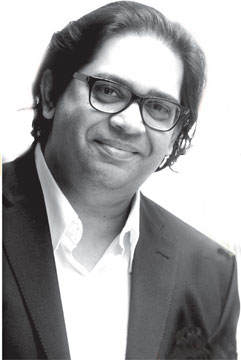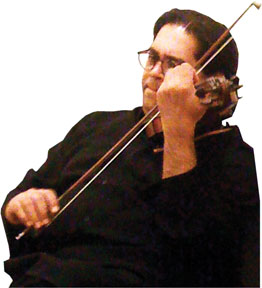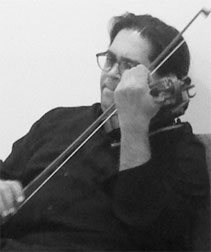|
Exclusive
Music makes the film
By Ranga CHANDRARATHNE
In an exclusive interview, Lakshman Joseph de Saram, the Sri Lankan
based international award-winning film composer reveals his most recent
projects, including the globally highly anticipated movie Bel Ami,
starring some of Hollywood’s biggest stars, notably, Robert Pattinson of
Twilight fame and Uma Thurman, the star of the Kill Bill series.
 Laksman
Joseph de Saram is an internationally reputed Sri Lankan musician who is
the founder of the Chamber Music Society of Sri Lanka, the region’s
newest platform for exciting and innovative interpretations of classics
and a champion for politically and culturally explosive music of
contemporary Sri Lanka and South Asia. Laksman
Joseph de Saram is an internationally reputed Sri Lankan musician who is
the founder of the Chamber Music Society of Sri Lanka, the region’s
newest platform for exciting and innovative interpretations of classics
and a champion for politically and culturally explosive music of
contemporary Sri Lanka and South Asia.
Lakshman is a post-modernist composer who revolutionised the Sri
Lankan music scene with his innovative and highly embellished film
music, exploiting the intrinsic properties of both classical and
contemporary Western music. He is a master exponent of classical and
applied music in Sri Lanka who has been recognised locally and
internationally for his peerless compositions of music.
Possibly the highest paid musician in the country, we ask Lakshman
about sadness, propaganda and money, and how they have impacted on his
creative output.
Question : On the completion of your 10th film score in 10 years,
from ‘Mille Soya’ to a multi million-dollar Hollywood film, where do you
see yourself now creatively?
Answer: Creatively, I accept what I have and try to make the best of
it. Craft-wise, I'm very much in the throes of honing those skills,
something I hope to keep on doing.
Q: What difference do you see between your first work on Mille
Soya and one of the last films you scored, Bel Ami for instance?
Craft
A: Actually, I have scored three films since ‘Bel Ami,’ and
I'm working on one currently. But the difference, if any, is the craft
and its the execution; the experience gained over the years has played a
big role. But content wise, you draw from the same spring essentially,
the core beam mostly never changes, all you do is drop the relevant
filters in front. But maybe, all the horrors and joys you have picked up
along the way add to the mix, who knows.
Q: Your music has tended to be more on the sad side of things,
why is so ?
A: It's the films I choose to do; they have mostly been the
reflective and melancholic types, plus, I am gradually beginning to
embrace and accept the undeniable truth, for me at least, that life, in
its shocking purity, is a dull constant ache, in the true Buddhist sense
of the word.
Comedy
Q: Would you like to score a comedy?
A: (Laughs) Possibly can see myself starting with a romantic
comedy before we go all out slapstick. No hurry though.
Q: Vimukthi Jayasundara's Between Two Worlds had you going for
a totally different soundscape, your music was hailed by the New York
Times for adding much to the film. How were you inspired to deviate from
your usual sound base?
 |
|
Lakshman Joseph de
Saram |
A: It took some time to figure out the general approach, and
when we did finally get to the studio with a mix of professional and
street musicians, I had a fistful of sheet music but only a vague idea
on how it was going to pan out. Things ultimately clicked after I flung
out most of the written music and went with an overdose of formatted
improvisation. After a load of trial and error and some bizarre demands
on the musicians, the music was described by Variety as a soul extractor
and the N.Y. Times called it 'a stirring score of blood and toxicity.'
Go figure.
Improvisations
Q: Is that how you approach your scores now, by using
improvisation?
A: No, all depends on the film's requirement. Bel Ami for
instance had over 72 pages of music written for full orchestra,
including harp and a 9-foot Bosendorfer. Mille Soya had a bunch of
drunken funeral band musicians; Le Papillion Noir had a string quartet
acting ever so preciously. It all depends.
Q: Boodee Keerthisena’s new film ‘Matha’ which is based on the
recent conflict, do you view it as propaganda or true cinema?
A: That's a sticky question, and you might get a better answer
from the director or writer.
Q: What were the compelling reasons for you to agree to score
this potentially jingoistic film, the story line? The contract fee?
A: Firstly, I did it as a favour to my friend Boodee;
secondly, I looked at it as an unrequited love story between two people
yearning for some sanity in their lives. Boodee battled to make sure
that there was no blatant triumphalism anywhere in the film. The ending
is hardly euphoric. As for the contract, my fee was laughable, even by
local standards. Ask the producers.
Q: Was it satisfying to score a war movie?
A: Frankly, If I looked at it purely as a war film, of winners
and losers, then no. You had this almost imperceptible, but very present
feeling of unease. Maybe because the conflict was still too fresh, the
blood was hardly dry, the memories jarring. I started working on the
film seven months after the final shot was fired. What the experience
did bring out to me was the essence and importance of 'time' when it
comes to dealing with expressing bloodshed through art, no matter how
cathartic.
Time makes all the difference, scoring a film, for instance, of the
defeat of King Elara by Prince Dutugamunu is so much easier on your mind
because it happened in sometime BC, not because it was any less brutal.
I am sure, in the years to come, there will be great films made on
various aspects on the history of the last 30 years of this country,
where we will be able to understand more dispassionately, the
ridiculousness of killing each other.
But, as I said before, this film for me was a love story, using the
brutality as an unfortunate backdrop.
Q: Still on the film, do you think Prasanna Vithanage or
Vimukthi Jayasundara, two directors who you know well and who have made
award-winning films about the war, would have undertaken to direct
Matha?
Control
A: I'm not sure, they normally only work with their own
scripts, or scripts they have total control over.
Q: Are you saying that Boodee had no control over the script?
A: Good question, but I'm not sure of the answer.
Q: You are presently working on a film by the French/Belgian
director Samy Pavel, what is it about?
A: I see it as a quiet ode to loneliness and disenchantment,
seen through the eyes of four women, a Thai, Japanese, Indian and
German. Four stories with a common thread running through out. Samy is
passionate; he is very sensitive to the subtleties that make a film
breath, and he is a master at the craft.
Q: Pavel is a director that has worked with composers like the
legendary Ennio Morricone and Oscar winner Gabriel Yared, how do you see
yourself in that exalted company?
A: An absolute nonentity.
Q: As a Sri Lankan based international composer, it is well
known throughout the industry that you command the highest fees. How
much does money play apart from your artistic decisions?
Money
A: First of all, I don't think I'm the highest paid, I
certainly don’t feel like I’m the highest paid anything for that matter,
and also, I did not dedicate my life to music and art because I wanted
to make money. If making money was my priority, as a teen, when I had to
make that all important decision, I would have dismissed the
recommendations of the international talent scouts, brushed aside the
opportunity to study at the most prestigious high school for the
performing arts, scoffed at getting into Juilliard, and instead, got an
MBA and put my mind into running a sweat shop or something.
High culture, as you know full well, is not for the profit minded. It
is an ethos, and for the initiated, it is a moral obligation.
Art and culture was around way before money was even thought about.
Of course, in the overtly commercial film world, market values are such
that a composer of the Zimmer variety (Hans Zimmer) scoring a Hollywood
blockbuster can make upwards of multiple millions of dollars for less
than thirty minutes of music, the hollowness is not lost on me, strange
world we live in.
Advice
Q: What advice do you have for aspiring Sri Lankan composers
who would like to follow in your footsteps, making the millions scoring
for international films staring people like Uma Thurman and Robert
Pattinson?
A: Honestly, I have no idea, other than to keep at it if you
have got something going; it's not enough to be merely gifted. It is
hard work. Also, if it's meant to happen, it will, I suppose.
 But
most importantly, my advice to aspiring musicians is that the motive
should be never about the millions. Leave that to the countless
mudalali’s of the world. Because if making money becomes the sole
factor, or an important factor in our sequence of ideas in the process
of expression, it’s over. You might as well put that effort into looking
at innovative ways on selling some cheap consumables to the public.
Forget about art. But
most importantly, my advice to aspiring musicians is that the motive
should be never about the millions. Leave that to the countless
mudalali’s of the world. Because if making money becomes the sole
factor, or an important factor in our sequence of ideas in the process
of expression, it’s over. You might as well put that effort into looking
at innovative ways on selling some cheap consumables to the public.
Forget about art.
Incentive
The incentive that aspiring musicians need to be aware of, is that
they belong to an elite few. That they have had someone recognize a rare
talent early on in their lives, encouraged them to nature and appreciate
it, spent years honing those talents in solitary confinement, and then
if lucky, have a great guru give it direction ultimately.
And if it all works out, the dividends are uncommon, not just the
kind measured by cash and a figure on a bottom line. That’s why, for
every one-in-a billion Mozart-like genius, you have a thousand-odd
pompous kings and barons who have dropped by the wayside of time, never
to be mentioned again. That was good enough incentive for me.
But then, the game of global creative arts is as fickle as it comes,
here today, gone tomorrow, or never there in the first place. The risks
are immense.
That’s why I certainly don’t encourage my children to take it up as a
profession. Who knows, you’ll soon see me looking into the world of
garments, or whatever makes money these days.
|

